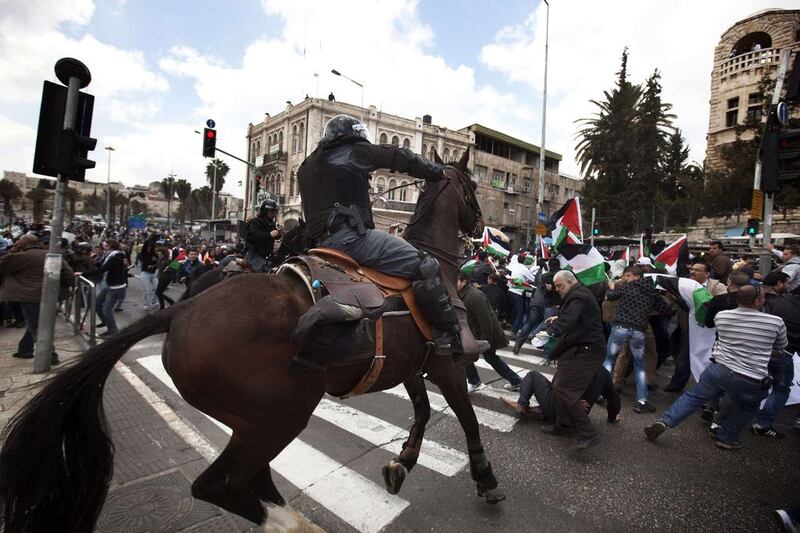Israeli prime minister Benjamin Netanyahu’s appointment of ultra-right politician Avigdor Lieberman to the post of defence minister has received ample attention in the international press.
It is clear confirmation of Tel Aviv’s further shift to the right, as Mr Lieberman is one of the most openly racist politicians in the country’s history. He has called for the bombing of the Aswan dam in the event of war with Egypt, and in addition to living in a West Bank settlement, he has demanded that Palestinian citizens of Israel take a loyalty oath to the Jewish state. Like many of his compatriots, he rejects the two-state solution and has promised to do everything in his power to entrench Israel’s occupation of the West Bank.
In today’s Israel, Mr Lieberman’s views aren’t considered extreme. He is the face of the new centre of Israeli politics. In a relatively short period of time, Israeli society has all but repudiated whatever trace elements of leftist political activity once existed. As the military has refined its control over Palestinian life in the West Bank and Gaza Strip, the Israeli government has accelerated its crackdown on leftist political groups and human rights NGOs.
For the past decade, the Israeli NGO Breaking the Silence has collected and released testimonies of human rights abuses by Israeli combat soldiers serving in the West Bank and Gaza. Released anonymously, the testimonies have demonstrated the shallowness of Tel Aviv’s claim that the Israeli military is a moral fighting force. Soldiers describe the military’s use of human shields, collective punishment, indiscriminate bombing and the arrest and mistreatment of children.
They also describe the less sensational aspects of Israel’s occupation – the night raids, the checkpoints, the verbal abuse – that nonetheless entrench control and ensure that Palestinians continuously feel the presence of their occupier.
This month, the Israeli government proceeded with efforts to end the group’s work once and for all. Along with other Israeli NGOs, Breaking the Silence has already been subject to legislation that will bar the organisation from receiving foreign funding, and even force its staff to wear special identification while inside the Israeli parliament (this specific provision was dropped from the final reading of the bill). Now, the government wants Breaking the Silence to hand over the names of its testifiers – more than 1,000 former soldiers.
The Israeli government argues that it needs the soldiers’ identities to investigate allegations of abuse; however, Breaking the Silence says that revealing the names would effectively end its testimony collection project. The organisation is protecting its sources in the same way journalists do. It doesn’t help the state’s case that the military censor approves all testimonies before they are published in the first place.
Making matters more complicated, most military investigations into abuse allegations are left without a conviction. After the Israeli attack on Gaza in 2008-2009, the Israeli army investigated 50 incidents of rights violations. This resulted in only three convictions.
But facts don’t matter because, ultimately, the state will win. So far, Israel has succeeded in passing one anti-democratic bill after another when it comes to leftist organisations. This type of crackdown is unremarkable in a colonial state like Israel, but the silencing of Breaking the Silence is significant for what it says about the state of Israeli society.
Much to the chagrin of other pro-Palestinian activists, Breaking the Silence was founded to speak to Israeli society. During the Second Intifada, Israelis didn’t speak about what their soldiers did in Palestine. Thus, there was a need to “break the silence” of the military conduct. Precisely because of their military service and claims to be Israeli patriots, the organisation has earned significant respect in international diplomatic circles.
Another Israeli NGO that has also been vilified by the state took an interesting decision last week. The human rights organisation B’Tselem announced it would no longer work with the Israeli army. The organisation has documented Israeli military abuses against Palestinians for decades, but will no longer cooperate with the military on behalf of Palestinians.
In an 80-page report on the failings of the military’s investigative system, B’Tselem wrote that “there is no longer any point in pursuing justice and defending human rights by working with a system whose real function is measured by its ability to continue to successfully cover up unlawful acts and protect perpetrators”.
The attacks on Breaking the Silence and B’Tselem demonstrate that the groups have no partner in the Israeli government. The Israeli public has also rejected these organisations and labelled them traitors who represent foreign interests.
The question now is: what will the members of these groups do? Will they use their positive reputation around the world to advocate external pressure on Israel to end the occupation? Will they turn their backs on Israeli society?
While liberal supporters of Israel are busy bemoaning Mr Lieberman’s appointment as “dangerous” and “unhelpful”, developments within the Israeli left demonstrate the extent to which the country has already moved to the right.
Mr Lieberman’s outright disgust of Palestinians and embrace of colonialism is the new centre in Israeli society. This is what major general Yair Golan was alluding to when, on Holocaust Remembrance Day this month, he said: “It’s scary to see horrifying developments that took place in [1930s] Europe beginning to unfold [in Israel]”. The only consolation in all of this is that the mask has finally been lifted from the facade of Israel’s supposed liberal foundations.
jdana@thenational.ae
On Twitter: @ibnezra





